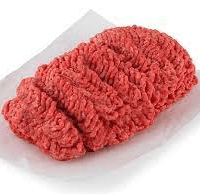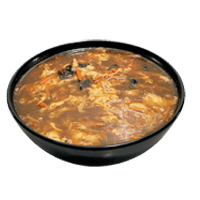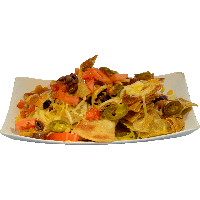Beefsteak nutrition: calories, carbs, GI, protein, fiber, fats
Beef, loin, top loin, separable lean and fat, trimmed to 1/8" fat, select, cooked, grilled
*all the values are displayed for the amount of 100 grams
Top nutrition facts for Beefsteak
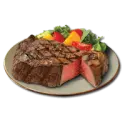
| Calories ⓘ Calories for selected serving | 250 kcal |
|
Glycemic index ⓘ
Source: The food is assumed to have 0 or no glycemic index bason on the fact that it has no carbs and that foods with 0 carbs have no glycemic index
Check out our Glycemic index chart page for the full list.
|
0 (low) |
| Insulin index ⓘ https://academic.oup.com/ajcn/article/66/5/1264/4655967 – II for topside lean beef steak is 51 | 51 |
| Net Carbs ⓘ Net Carbs = Total Carbohydrates – Fiber – Sugar Alcohols | 0 grams |
| Acidity (Based on PRAL) ⓘ PRAL (Potential renal acid load) is calculated using a formula. On the PRAL scale the higher the positive value, the more is the acidifying effect on the body. The lower the negative value, the higher the alkalinity of the food. 0 is neutral. | 12.9 (acidic) |
Protein ⓘHigher in Protein content than 90% of foods
Vitamin B3 ⓘHigher in Vitamin B3 content than 81% of foods
Zinc ⓘHigher in Zinc content than 81% of foods
Vitamin B6 ⓘHigher in Vitamin B6 content than 80% of foods
Saturated fat ⓘHigher in Saturated fat content than 79% of foods
Beefsteak calories (kcal)
| Calories for different serving sizes of beefsteak | Calories | Weight |
|---|---|---|
| Calories in 100 grams | 250 | |
| Calories in 3 oz | 213 | 85 g |
Beefsteak Glycemic index (GI)
Source:
The food is assumed to have 0 or no glycemic index bason on the fact that it has no carbs and that foods with 0 carbs have no glycemic index
Check out our Glycemic index chart page for the full list.
Mineral coverage chart
Mineral chart - relative view
Vitamin coverage chart
Vitamin A:
0µg of 900µg
0%
Vitamin E:
1.4mg of 15mg
9%
Vitamin D:
0µg of 20µg
0%
Vitamin C:
0mg of 90mg
0%
Vitamin B1:
0.23mg of 1mg
20%
Vitamin B2:
0.42mg of 1mg
32%
Vitamin B3:
21mg of 16mg
131%
Vitamin B5:
1.6mg of 5mg
32%
Vitamin B6:
1.8mg of 1mg
135%
Folate:
24µg of 400µg
6%
Vitamin B12:
4.1µg of 2µg
173%
Vitamin K:
4.8µg of 120µg
4%
Vitamin chart - relative view
Macronutrients chart
Protein:
Daily Value: 53%
26.7 g of 50 g
26.7 g (53% of DV )
Fats:
Daily Value: 23%
15.1 g of 65 g
15.1 g (23% of DV )
Carbs:
Daily Value: 0%
0 g of 300 g
0 g (0% of DV )
Water:
Daily Value: 3%
58 g of 2,000 g
58 g (3% of DV )
Other:
0.2 g
0.2 g
Protein quality breakdown
Tryptophan:
519mg of 280mg
185%
Threonine:
3162mg of 1,050mg
301%
Isoleucine:
3603mg of 1,400mg
257%
Leucine:
6297mg of 2,730mg
231%
Lysine:
6690mg of 2,100mg
319%
Methionine:
2061mg of 1,050mg
196%
Phenylalanine:
3126mg of 1,750mg
179%
Valine:
3927mg of 1,820mg
216%
Histidine:
2526mg of 700mg
361%
Fat type information
Saturated fat:
6 g
Monounsaturated fat:
6.3 g
Polyunsaturated fat:
0.56 g
All nutrients for Beefsteak per 100g
| Nutrient | Value | DV% | In TOP % of foods | Comparison |
| Vitamin A | 0µg | 0% | 100% | |
| Calories | 250kcal | 13% | 38% |
5.3 times more than Orange
|
| Protein | 27g | 64% | 10% |
9.5 times more than Broccoli
|
| Fats | 15g | 23% | 23% |
2.2 times less than Cheese
|
| Vitamin C | 0mg | 0% | 100% |
N/A
|
| Carbs | 0g | 0% | 100% |
N/A
|
| Net carbs | 0g | N/A | 75% |
N/A
|
| Cholesterol | 79mg | 26% | 22% |
4.7 times less than Egg
|
| Magnesium | 23mg | 5% | 50% |
6.1 times less than Almonds
|
| Calcium | 22mg | 2% | 51% |
5.7 times less than Milk
|
| Potassium | 340mg | 10% | 28% |
2.3 times more than Cucumber
|
| Iron | 1.6mg | 20% | 45% |
1.6 times less than Beef broiled
|
| Sugar | 0g | N/A | 100% |
N/A
|
| Fiber | 0g | 0% | 100% |
N/A
|
| Copper | 0.07mg | 8% | 68% |
1.9 times less than Shiitake
|
| Zinc | 4.9mg | 44% | 19% |
1.3 times less than Beef broiled
|
| Phosphorus | 213mg | 30% | 33% |
1.2 times more than Chicken meat
|
| Sodium | 57mg | 2% | 67% |
8.6 times less than White bread
|
| Vitamin E | 0.45mg | 3% | 59% |
3.2 times less than Kiwi
|
| Manganese | 0.01mg | 0% | 93% | |
| Selenium | 29µg | 52% | 34% | |
| Vitamin B1 | 0.08mg | 7% | 57% |
3.4 times less than Pea raw
|
| Vitamin B2 | 0.14mg | 11% | 60% |
1.1 times more than Avocado
|
| Vitamin B3 | 7mg | 44% | 19% |
1.4 times less than Turkey meat
|
| Vitamin B5 | 0.53mg | 11% | 57% |
2.1 times less than Sunflower seeds
|
| Vitamin B6 | 0.59mg | 45% | 20% |
4.9 times more than Oats
|
| Vitamin B12 | 1.4µg | 58% | 38% |
2 times more than Pork
|
| Vitamin K | 1.6µg | 1% | 70% |
63.5 times less than Broccoli
|
| Folate | 8µg | 2% | 68% |
7.6 times less than Brussels sprouts
|
| Saturated fat | 6g | 30% | 21% |
Equal to Beef broiled
|
| Choline | 102mg | 19% | 50% | |
| Monounsaturated fat | 6.3g | N/A | 25% |
1.6 times less than Avocado
|
| Polyunsaturated fat | 0.56g | N/A | 59% |
84.2 times less than Walnut
|
| Tryptophan | 0.17mg | 0% | 69% |
1.8 times less than Chicken meat
|
| Threonine | 1.1mg | 0% | 54% |
1.5 times more than Beef broiled
|
| Isoleucine | 1.2mg | 0% | 52% |
1.3 times more than Salmon raw
|
| Leucine | 2.1mg | 0% | 52% |
1.2 times less than Tuna Bluefin
|
| Lysine | 2.2mg | 0% | 52% |
4.9 times more than Tofu
|
| Methionine | 0.69mg | 0% | 52% |
7.2 times more than Quinoa
|
| Phenylalanine | 1mg | 0% | 53% |
1.6 times more than Egg
|
| Valine | 1.3mg | 0% | 52% |
1.6 times less than Soybean raw
|
| Histidine | 0.84mg | 0% | 53% |
1.1 times more than Turkey meat
|
| Caffeine | 0mg | 0% | 100% | |
| Omega-3 - EPA | 0g | N/A | 100% |
N/A
|
| Omega-3 - DHA | 0g | N/A | 100% |
N/A
|
| Omega-3 - DPA | 0g | N/A | 100% |
N/A
|
Check out similar food or compare with current
NUTRITION FACTS LABEL
Nutrition Facts
___servings per container
Serving Size ______________
Serving Size ______________
Amount Per 100g
Calories 250
% Daily Value*
23%
Total Fat
15g
27%
Saturated Fat 6g
0
Trans Fat
0g
26%
Cholesterol 79mg
2.5%
Sodium 57mg
0
Total Carbohydrate
0g
0
Dietary Fiber
0g
Total Sugars 0g
Includes ? g Added Sugars
Protein
27g
Vitamin D
0mcg
0
Calcium
22mg
2.2%
Iron
1.6mg
20%
Potassium
340mg
10%
*
The % Daily Value (DV) tells you how much a nutrient in a serving of food contributes to a daily diet. 2,000 calories a day is used for general nutrition advice.
Health checks
ⓘ
Dietary cholesterol is not associated with an increased risk of coronary heart disease in healthy individuals. However, dietary cholesterol is common in foods that are high in harmful saturated fats.
Source
Low in Cholesterol
ⓘ
Trans fat consumption increases the risk of cardiovascular disease and mortality by negatively affecting blood lipid levels.
Source
No Trans Fats
ⓘ
Saturated fat intake can raise total cholesterol and LDL (low-density lipoprotein) levels, leading to an increased risk of atherosclerosis. Dietary guidelines recommend limiting saturated fats to under 10% of calories a day.
Source
Low in Saturated Fats
ⓘ
While the consumption of moderate amounts of added sugars is not detrimental to health, an excessive intake can increase the risk of obesity, and therefore, diabetes.
Source
Low in Sugars
Beefsteak nutrition infographic
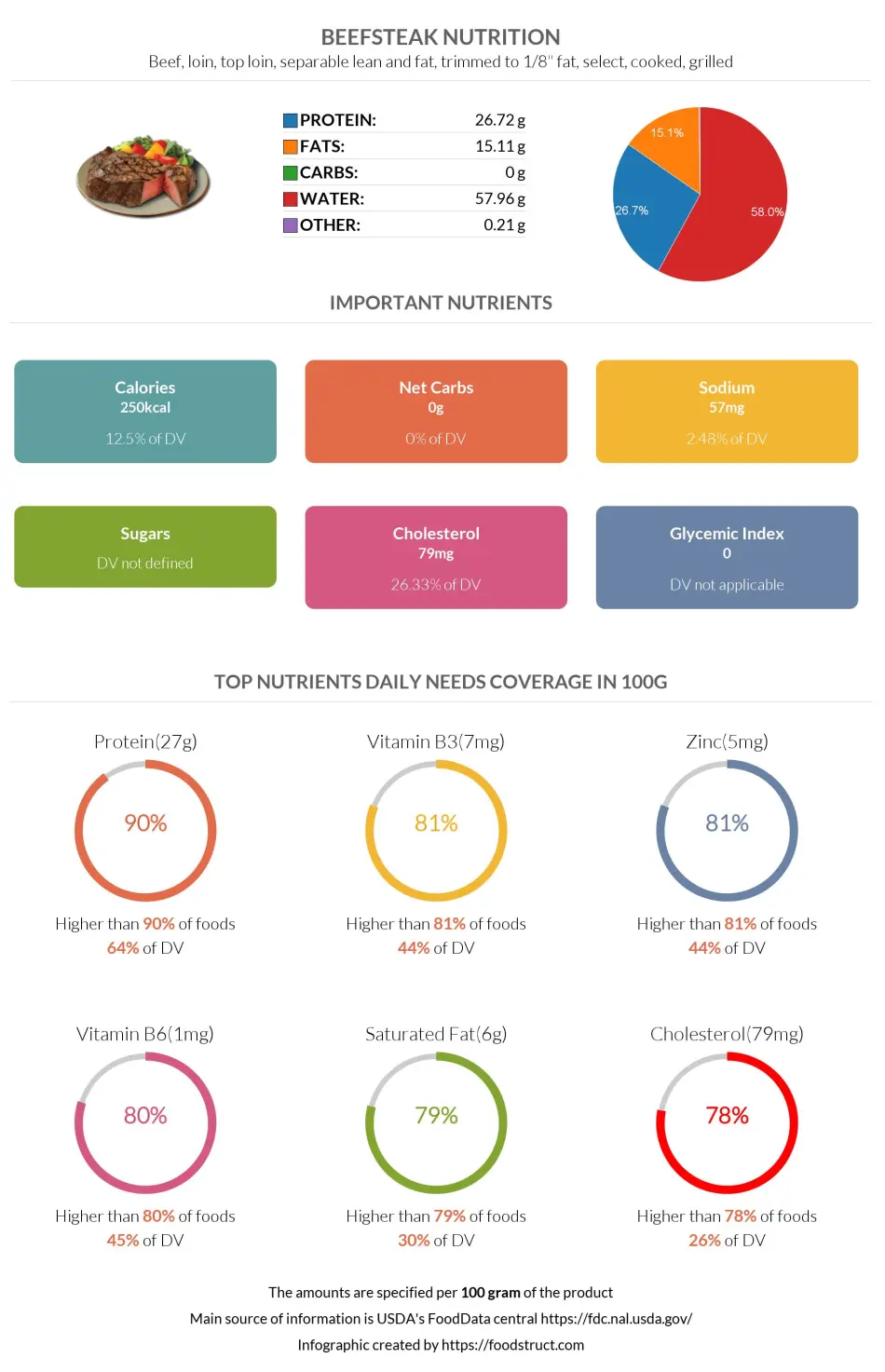
Infographic link
References
All the values for which the sources are not specified explicitly are taken from FDA’s Food Central. The exact link to the food presented on this page can be found below.
